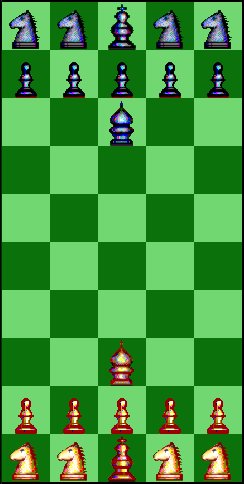Gnu
Gnu is a simple chess variant played on a board with 5 files and 10 ranks. The name Gnu comes from one of the featuring pieces. It is the piece with the shortest name, so it should express the simplicity of the game. There are five different pieces of which one (the Gnu) can only be acquired through promotion.Setup
The initial array is like this:

For White:
A King on c1
Knights on a1, b1, d1 and e1
Pawns on a2, b2, c2, d2 and e2
A Ferz on c3
For Black:
A King on c10
Knights on a10, b10, d10 and e10
Pawns on a9, b9, c9, d9 and e9
A Ferz on c8
Pieces
The King, Knight and Pawn move like there namesakes in chess. However, there is no castling. Pawns' initial double step and en-passent capture are the same as in chess. Promotion, however, is different.The Ferz moves one square diagonally. No piece can capture the Ferz. This piece appears in other games as an Iron Guard
The Gnu moves either like a chess Knight or like an exaggerated Knight, moving three squares in one direction and one over. The exaggerated Knight is called Camel in other games. The Gnu, which is the compound piece of a Knight and Camel is also called Wildebeest in games. There are no Gnus in the starting arrays. Gnus are acquired through promotion.
Rules
The goal is either to checkmate the opponent's King or to move your King to a safe position on the opponent's back rank. No piece can capture the Ferz. Stalemate should be very rare and is a draw. If a Pawn or Knight reaches the opponent's back rank, it promotes to a Gnu. Promotion is compulsory. There is no limit on how many Gnus a player can get, so when a player manages to promote all his or her Knights and Pawns, he or she can have nine Gnus. A Ferz that reaches the opponent's back rank has no special effect.Notes
The main element of the game is the board's shape. Pieces act differently on a 5x10 board than on an 8x8 board. This 'user submitted' page is a collaboration between the posting user and the Chess Variant Pages. Registered contributors to the Chess Variant Pages have the ability to post their own works, subject to review and editing by the Chess Variant Pages Editorial Staff.
This 'user submitted' page is a collaboration between the posting user and the Chess Variant Pages. Registered contributors to the Chess Variant Pages have the ability to post their own works, subject to review and editing by the Chess Variant Pages Editorial Staff.
By Joost Aan de Brugh.
Web page created: 2006-02-28. Web page last updated: 2006-02-28